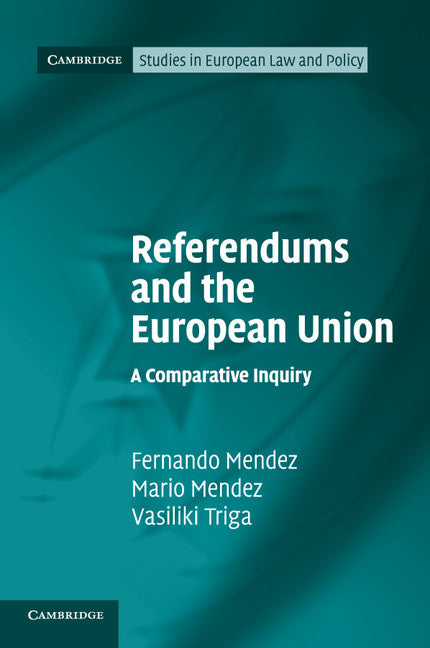Freshly Printed - allow 8 days lead
Couldn't load pickup availability
Referendums and the European Union
A Comparative Inquiry
A comprehensive and comparative treatment of the EU referendum experience based on an interdisciplinary approach that combines law and politics.
Fernando Mendez (Author), Mario Mendez (Author), Vasiliki Triga (Author)
9781316603369, Cambridge University Press
Paperback / softback, published 23 June 2016
282 pages, 32 b/w illus. 10 tables
23 x 15.5 x 1.5 cm, 0.42 kg
"The authors offer an insightful analysis of EU referendums … [they] make clear their intentions to bridge the research conducted on referendums by political scientists with the work of legal scholars … the result should be interesting to anyone interested in questions about how democracy currently functions and may evolve in a system as complex as the European Union."
N. Clark, EUSA Review
Why have referendums on European integration proliferated since the 1970s? How are referendums accommodated within member states' constitutional orders and with what impact on the European integration process? What is the likely institutional impact of referendums on the future of the European integration process? Drawing on an interdisciplinary approach, these are just some of the fundamental questions addressed in this book. The central thesis is that the EU is faced with a 'direct democratic dilemma', which is compounded by the EU's rigid constitutional structure and a growing politicisation of the referendum device on matters related to European integration. Referendums and the European Union discusses how this dilemma has emerged to impact on the course of integration and how it can be addressed.
1. Direct democracy, referendums, and European integration: a conceptual framework
2. Constitutionally accommodating European integration: the role and impact of the referendum
3. Political dynamics around EU related referendums
4. EU institutional adaptation in the shadow of the extraterritorial referendum
5. Dilemmas of direct democracy: the EU from comparative perspective
6. Models of constitutional design
7. Conclusion.
Subject Areas: Law [L], EU & European institutions [JPSN2], Politics & government [JP]


